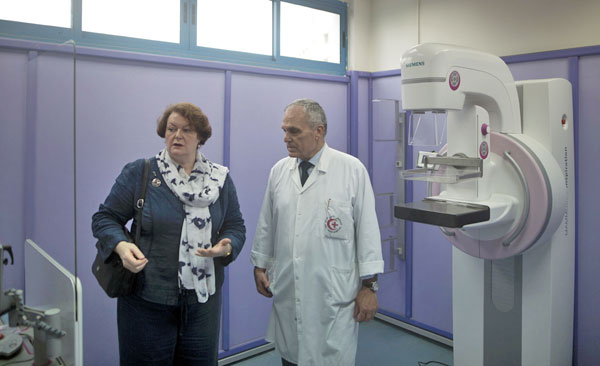GAZA CITY — British lawmakers normally spend their breaks catching up on paperwork or holidaying, but one parliamentarian has instead travelled more than 3,200km to the Palestinian territories to carry out life-saving breast cancer surgery.
Philippa Whitford, a parliamentarian for Central Ayrshire in Scotland and a breast cancer expert before entering parliament, travelled to provide care for a number of Palestinian women, who face an uphill struggle to get quality treatment.
Whitford carried out four major cancer operations in the occupied West Bank last week, before travelling to Gaza on Sunday to advise hospitals there on how to improve their care.
One operation was on a woman with "very advanced" cancer, said the lawmaker, who returned to the United Kingdom on Thursday.
"It was very large in the breast and very advanced in the lymph nodes. She had had chemotherapy, but it hadn't got a lot smaller and she still had a lot of disease."
"It was just a difficult operation and we knew it would be," she said, adding that initial signs suggested it had been successful.
Whitford, who became a lawmaker for the left-wing Scottish National Party (SNP) in the 2015 British election, said breast cancer treatment in the Palestinian territories suffered from a lack of planning, resources and Israeli restrictions.
In Gaza, breast cancer kills more women than any other cancer, according to a 2011 research paper by researchers from Harvard Medical School.
The strip, run by Islamist movement Hamas, has been under an Israeli blockade since 2006.
Full breast removal
There are regular shortages of medicines including those to treat cancer and no radiotherapy in the coastal enclave.
“Getting anything into Gaza is not secure. You can’t say ‘we get a delivery every month and it will be here and the hospital will be stocked.’ So they are forever running out of things,” Whitford said.
She said that, while in England doctors would usually remove just a part of the breast, in Gaza they tend to remove the whole breast — whether through lack of training or due to limited medical facilities.
Radiotherapy is available in Israel and east Jerusalem, but Palestinians say travel permits are hard to obtain, border points can be closed depending on events, and some cannot afford the trip.
More than 120,000 Palestinians entered Israel for medical treatment in 2015, mostly from the West Bank, according to Israeli officials.
The lack of quality treatment in Palestinian territories, Whitford said, meant recurrence rates are believed to be more than double those in the United Kingdom.
No delegation of British lawmakers has been permitted entry into Gaza by Israel since 2009. Earlier this year a delegation of members of the European parliament was refused entry.
But Whitford applied and entered as a single doctor rather than in a delegation, thus skirting Israel’s restrictions.
It was a return for her, having worked as a breast cancer surgeon in Gaza for 18 months in the early 1990s with Medical Aid for the Palestinians.
She said returning to the Palestinian enclave was like “coming home”.
Social stigma
More than 8 per cent of Palestinian women develop breast cancer in their lifetime, the Palestinian health ministry says.
But Whitford said breast cancer was for a long time a hidden killer in Gaza due to social stigma.
“When I came [in 1991] the doctors told me there was no breast cancer here,” she said.
“As soon as people realised there was a woman surgeon they started to come and I realised there was actually a lot of breast cancer.”
Whitford said she never expected to be a lawmaker, but that her skills helped her in her role as the SNP’s shadow health spokeswoman.
The British parliament doesn’t meet between 24 March and 11 April this year.
The leftwing SNP has also criticised the British government’s lack of firm action over Israel’s continued expansion of settlements in the West Bank, which are considered illegal under international law.
Whitford said the West Bank, which is supposed to form the bulk of a future Palestinian state, is “being moth-eaten — every time I come back the settlements are bigger, they are closer to key Palestinian towns and cities.”
“We need to be saying ‘we don’t want to deal with settlements, we don’t want British registered companies to be dealing with settlements.”
